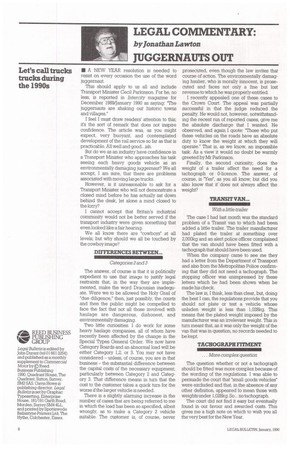LEGAL COMMENTARY:
Page 10

If you've noticed an error in this article please click here to report it so we can fix it.
by Jonathan Lawton
JUGGERNAUTS OUT
Let's call trucks trucks during the 1990s
• A NEW YEAR resolution is needed to resist on every occasion the use of the word Juggernaut.
This should apply to us all and include Transport Minister Cecil Parkinson. For he, no less, is reported in Intercity magazine for December 1989/january 1990 as saying: "The Juggernauts are shaking our histonc towns and villages."
I feel I must draw readers' attention to this; it's the sort of remark that does not inspire confidence. The article was, as you might expect, very buoyant, and contemplated development of the rail service so far as that is practicable. All well and good...ish.
But do we as an industry have confidence in a Transport Minister who approaches his task seeing each heavy goods vehicle as an environmentally damaging juggernaut? We all accept, I am sure, that there are problems associated with moving large trucks.
However, is it unreasonable to ask for a Transport Minister who will not demonstrate a closed mind before he has actually sat down behind the desk, let alone a mind closed to the lorry?
I cannot accept that Britain's industrial community would not be better served if the transport industry were given something that even looked like a fair hearing.
We all know there are "cowboys" at all levels; but why should we all be touched by the cowboy image?
DIFFERENCES BETWEEN... Categories 2 and 3 The answer, of course is that it is politically expedient to use that image to justify legal restraints that, in the way they are implemented, make the word Draconian inadequate. Were we to be allowed the Holy Grail of "due diligence," then, just possibly, the courts and then the public might be compelled to face the fact that not all those involved with haulage are dangerous, dishonest, and environmentally damaging.
Two little curiosities. I do work for some heavy haulage companies, all of whom have recently been affected by the change in the Special Types General Order. We now have Category Boards and an abnormal load will be either Category 1,2, or 3. You may not have considered unless, of course, you are in that business the substantial difference between the capital costs of the necessary equipment; particularly between Category 2 and Category 3. That difference means in turn that the cost to the customer takes a quick turn for the worse if the larger vehicle is needed.
There is a slightly alarming increase in the number of cases that are being referred to me in which the load has been so specified, albeit wrongly, as to make a Category 2 vehicle suitable. The customer is, of course, never prosecuted, even though the law invites that course of action. The environmentally damaging haulier, who is morally innocent, is prosecuted and faces not only a fine but lost revenue to which he was properly entitled.
I recently appealed one of these cases to the Crown Court. The appeal was partially successful in that the judge reduced the penalty. He would not, however, notwithstanding the recent run of reported cases, give me the absolute discharge that I wanted. He observed, and again I quote: "Those who put these vehicles on the roads have an absolute duty to know the weight at which they will operate." That is, as we know, an impossible task. As a view it would no doubt be warmly greeted by Mr Parkinson.
Finally, the second curiosity; does the weight of a trailer affect the need for a tachograph or 0-licence. The answer, of course, is "Yes", as you all know; but did you also know that it does not always affect the weight?
TRANSIT VAN... With a little trailer
The case I had last month was the standard problem of a Transit van to which had been added a little trailer. The trailer manufacturer had plated the trailer at something over 2,000kg and an alert police officer complained that the van should have been fitted with a tachograph that should have been used.
When the company came to see me they had a letter from the Department of Transport and also from the Metropolitan Police confirming that they did not need a tachograph, The stopping officer was unimpressed by these letters which he had been shown when he made his check.
The law is, I think, less than clear, but, doing the best I can, the regulations provide that you should not plate or test a vehicle whose unladen weight is less than 1,028kg. This means that the plated weight imposed by the manufacturer was an irrelevant weight. This in turn meant that, as it was only the weight of the van that was in question, no records needed to be kept.
TACHOGRAPH FITMENT . . More complex question The question whether or not a tachograph should be fitted was more complex because of the wording of the regulations I was able to persuade the court that "small goods vehicles" were excluded and that, in the absence of any other definition, appeared to mean those with weights under 1,028kg. So... no tachograph.
The court did not find it easy but eventually found in our favour and awarded costs. This gives me a high note on which to wish you all the very best for the New Year.
















































































































